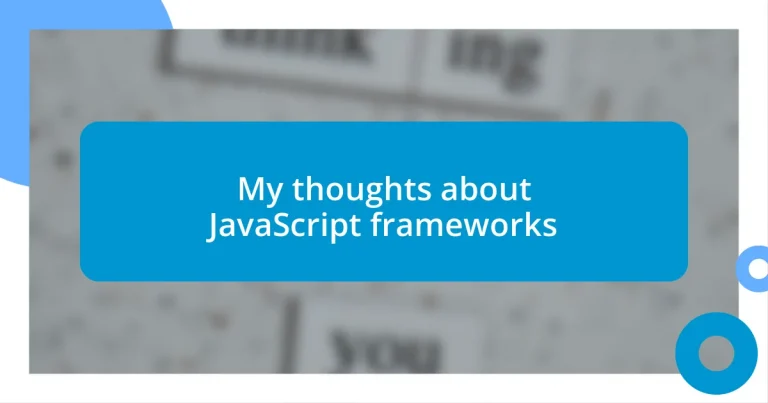Key takeaways:
- Choosing the right JavaScript framework significantly impacts both short-term productivity and long-term project success, affecting performance, scalability, and maintenance.
- Community support and quality documentation are crucial factors when selecting a framework, enhancing the development experience and providing assistance when challenges arise.
- The future of JavaScript frameworks is leaning towards improved performance, server-side rendering, and the integration of TypeScript, which promotes better developer experience and code safety.
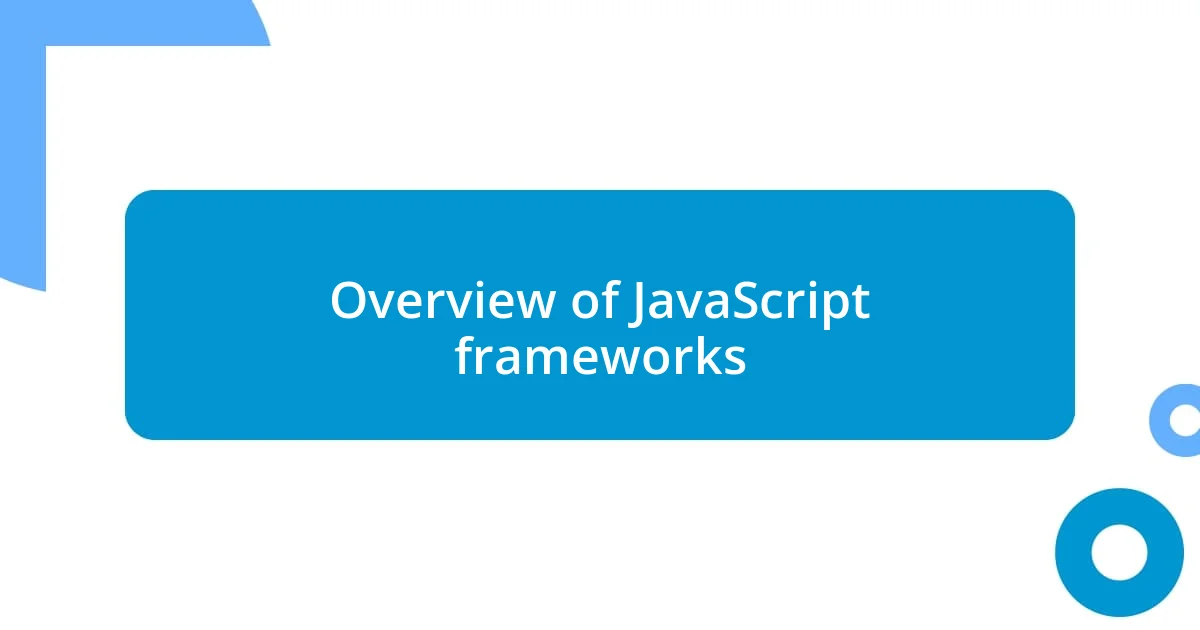
Overview of JavaScript frameworks
JavaScript frameworks are essential tools that streamline web development. They provide developers with reusable components and a structured way to build applications, which I’ve found incredibly helpful when juggling multiple projects. Have you ever felt overwhelmed by starting a new app from scratch? Frameworks can take that pressure away.
With a variety of frameworks available, like React, Angular, and Vue.js, there’s something for everyone, no matter your project or skill level. I remember the first time I dived into React; I was amazed at how quickly I could build a functional interface compared to using plain JavaScript. It made me wonder how I ever managed without it.
The choice of framework can significantly impact your development experience and the final product. It’s like picking the right tool for the job. I always ask myself, “What do I want to achieve?” because the right framework can make all the difference in performance and maintenance down the line.
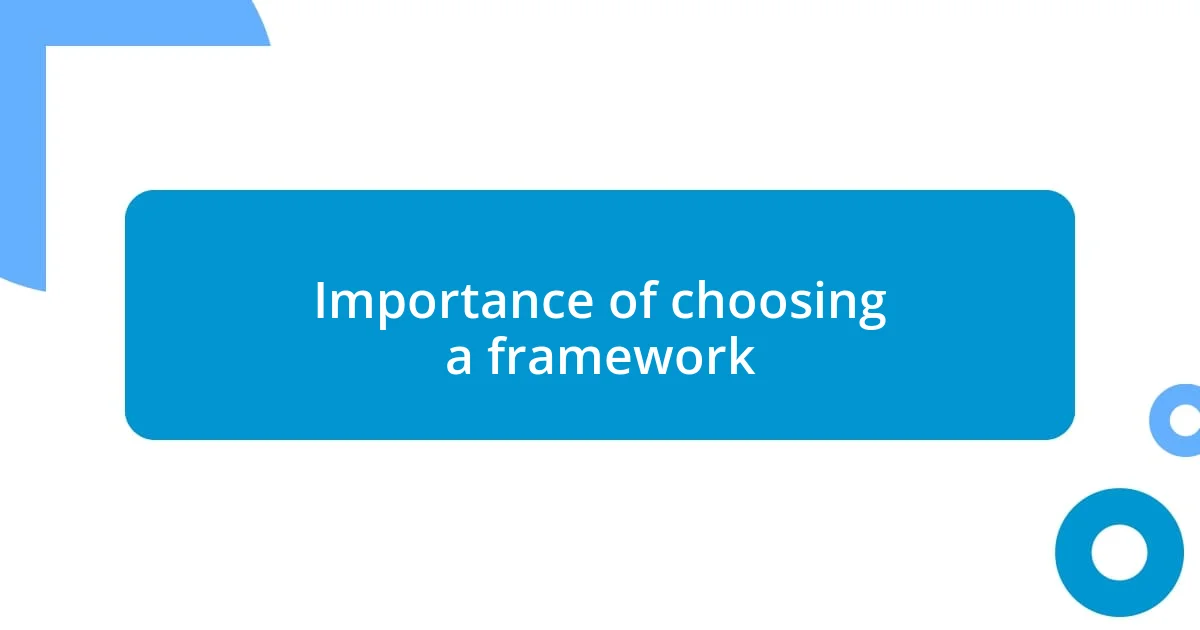
Importance of choosing a framework
Choosing the right JavaScript framework is crucial for both your short-term productivity and long-term project success. I remember when I first switched from jQuery to Angular; it felt like discovering a new dimension in development. The structure and built-in features accelerated my workflow, making the learning curve worthwhile. Have you ever faced a project deadline, only to realize your current tools were holding you back? The right framework can save precious time.
Frameworks not only set the stage for development but also influence your application’s performance and scalability. I once built a small web app using a lightweight framework, and as my user base grew, I realized the limitations it posed. Choosing a framework that can scale with your project is like finding a well-fitting pair of shoes—comfortable at first, but critical for those long runs.
Moreover, the community and ecosystem surrounding a framework can greatly enhance your experience. Back when I was dabbling in Vue.js, the wealth of plugins, tutorials, and community support created a sense of belonging. It’s empowering to know that help is just a forum post away when you hit a snag.
| Framework | Key Benefits |
|---|---|
| React | Component-based architecture, virtual DOM for improved performance |
| Angular | Comprehensive solution with powerful features like two-way data binding |
| Vue.js | Lightweight, approachable, and easy integration with existing projects |
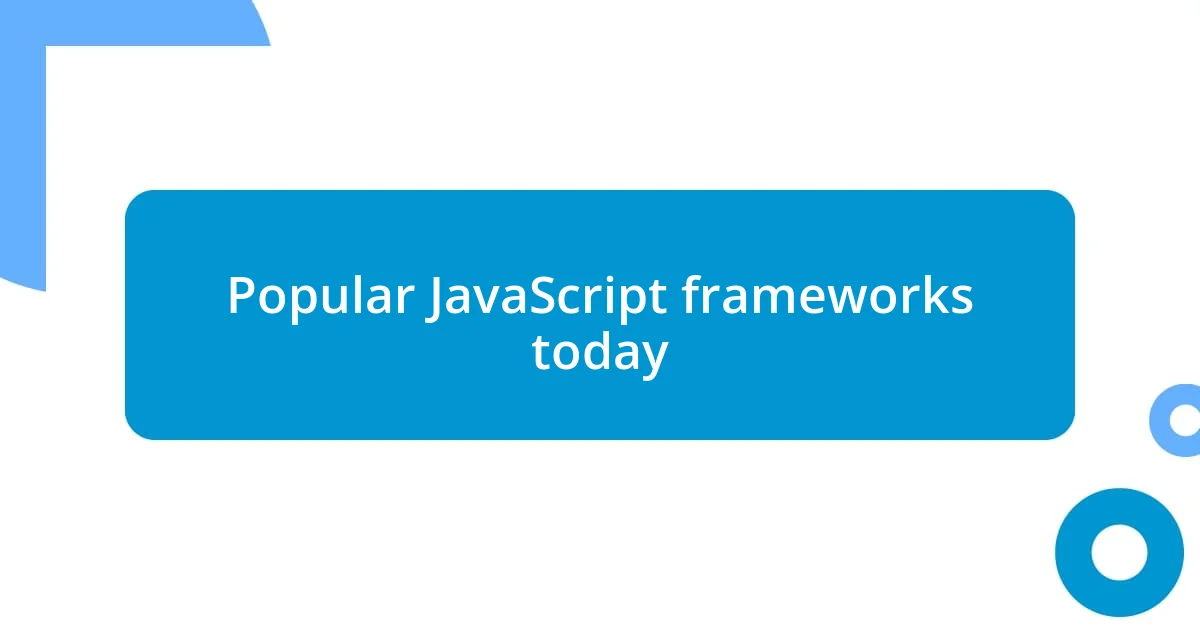
Popular JavaScript frameworks today
When it comes to popular JavaScript frameworks today, a few stand out not only for their functionality but also for their vibrant communities. Personally, I’ve found that each framework brings its own flavor to the development process. For instance, working with React felt like using a powerful engine; I could build and iterate quickly, especially when I discovered hooks to manage state more easily. On the other hand, my time with Angular was like climbing a mountain—it required effort, but the view from the top, with its structured approach and robust features, was worth every step.
Here are some of the most talked-about JavaScript frameworks today:
- React: Known for its flexibility and efficiency in rendering UI components.
- Angular: A complete framework that offers a rich set of integrated tools for comprehensive development.
- Vue.js: Celebrated for its simplicity and ease of integration into existing applications.
- Svelte: An emerging favorite, which compiles code at build time for impressive performance.
In my experience, each framework has its own set of quirks that make it unique. I remember first trying out Vue.js; its reactivity model felt fresh and intuitive, like picking up a new hobby that instantly clicked! The ease of creating components and seeing real-time updates made the learning process delightful. And then there’s Svelte, which I came across more recently. The instant feedback when developing small applications felt magical—it’s as if I stepped into the future of JavaScript.
Choosing a framework should reflect not just the project requirements, but also your own style and preference, transforming coding into a more personal adventure.
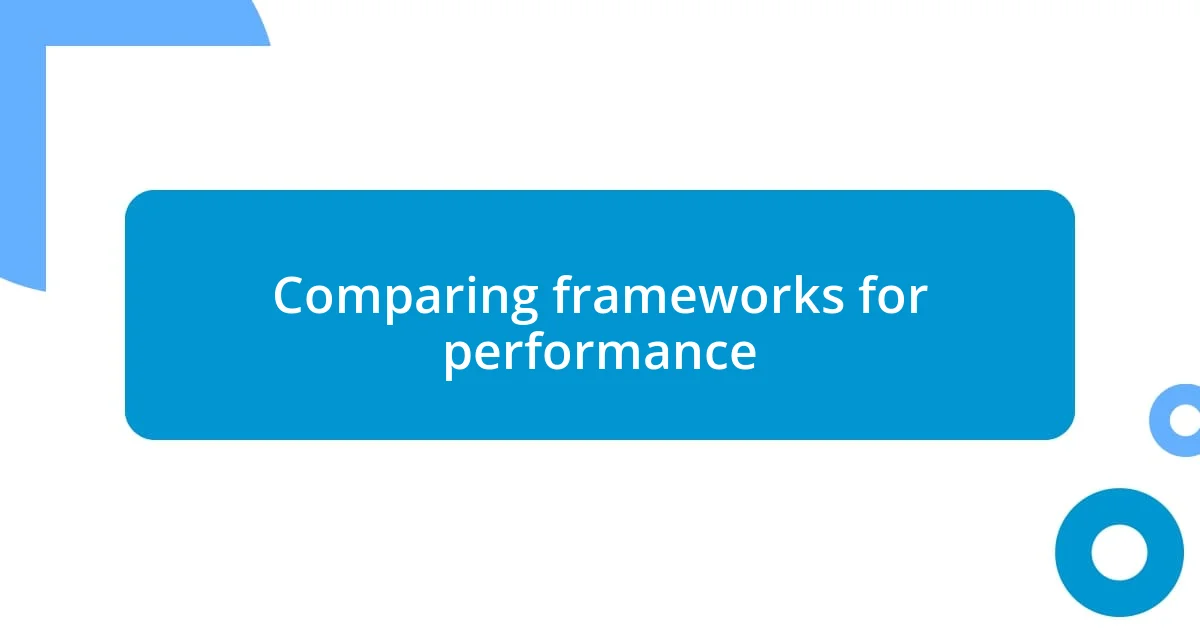
Comparing frameworks for performance
When I dive into comparing frameworks for performance, a few key factors always come to mind. React’s virtual DOM is like a secret weapon; it allows for efficient updates that make my web applications feel snappy. I remember working on a project with heavy UI interaction, and the performance boost I experienced after switching to React was truly transformational.
On the flip side, Angular’s two-way data binding makes it an interesting contender, particularly for complex applications where data needs to stay in sync seamlessly. I found this feature incredibly handy during a challenging client project where state management was a headache. Have you ever wrestled with keeping data in sync, only to discover that a framework feature could have saved you hours?
Then there’s Vue.js, which I often recommend for its flexibility. It strikes a nice balance between performance and simplicity. I recall building a small personal project using Vue, and I was amazed at how quickly I could get results without compromising performance. It really felt like finding a middle ground that just clicks—sometimes, that’s all you need to keep the creative juices flowing.
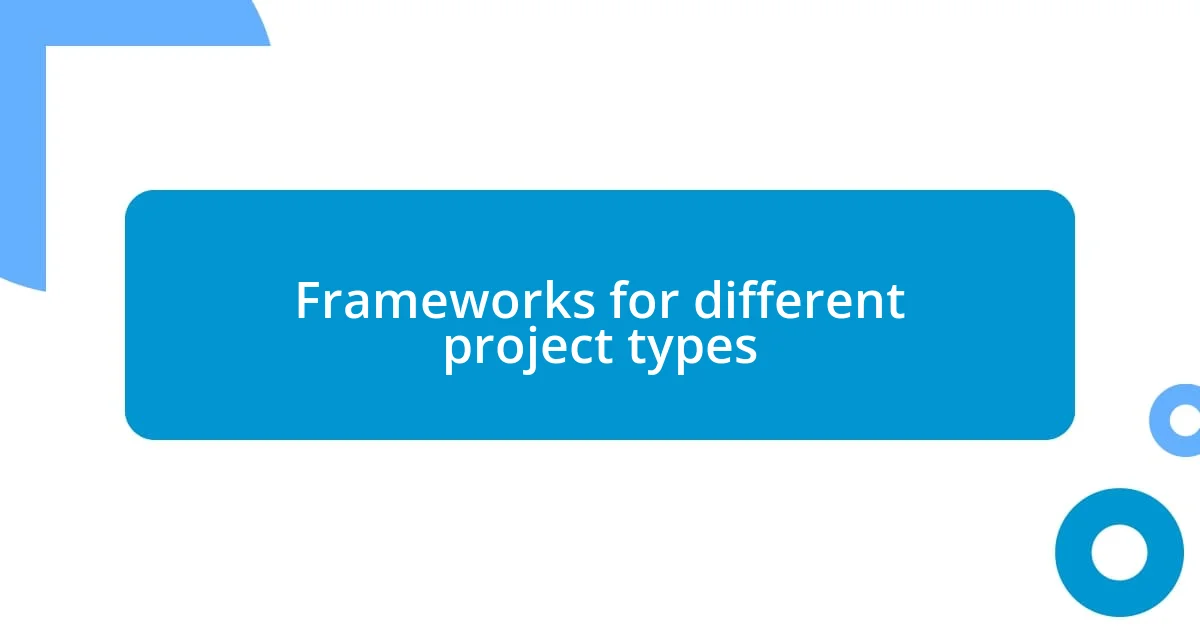
Frameworks for different project types
When it comes to choosing the right JavaScript framework for different project types, context is everything. For a lean, single-page application where speed is critical, I often lean towards React. I vividly remember a project where the client needed a fast turnaround on a dashboard. Using React made the process enjoyable; the component-based architecture streamlined my workflow, and I felt empowered to create a user-friendly interface quickly.
On the flip side, if I’m tackling a large-scale enterprise application, Angular usually becomes my go-to choice. I once worked on an ambitious project with numerous interdependencies, and Angular’s powerful structure helped manage that complexity. It felt like having a well-organized toolbox, where everything had its place, allowing me to build features systematically. Have you ever experienced that comforting sense of order in a chaotic project? It makes all the difference!
For smaller projects or when I want to try something new, I often choose Vue.js. Its gentle learning curve reminds me of the first time I picked up a new instrument—it’s satisfying and encourages experimentation. I distinctly recall building a quick prototype with Vue, and it was a breeze to integrate. The seamless way it handled transitions left me feeling energized. In my view, selecting a framework shouldn’t just be about the technical specs; it should also resonate with your creative instincts and project goals.
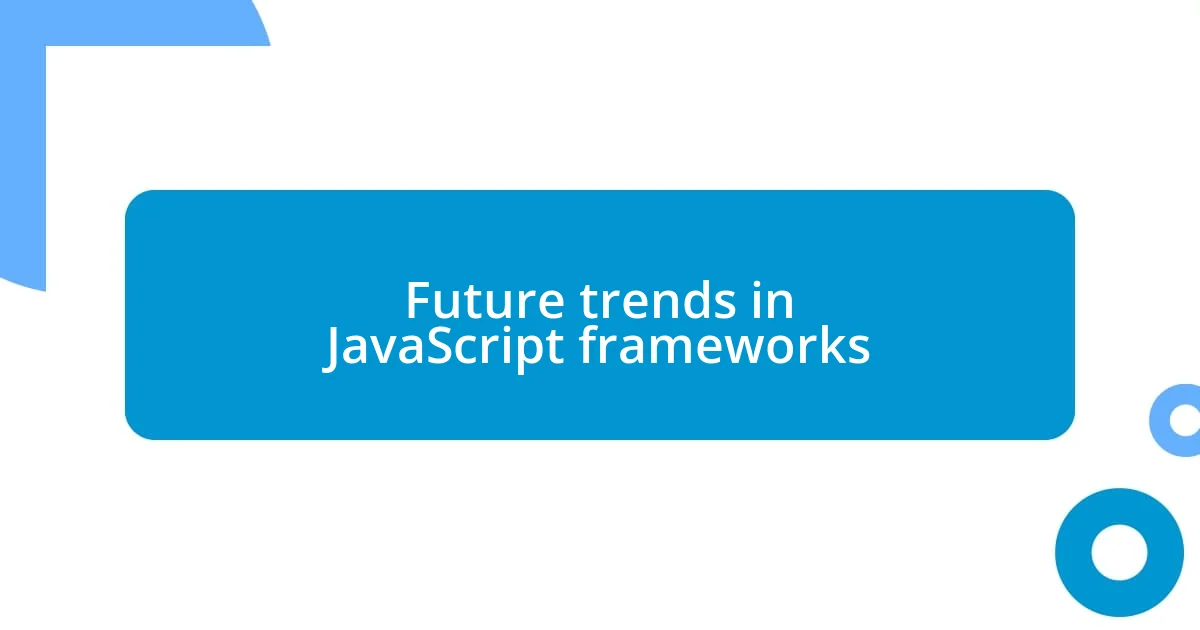
Future trends in JavaScript frameworks
The future of JavaScript frameworks is shaping up to be heavily influenced by the growing emphasis on server-side rendering and improved performance. I recently experimented with Next.js, a React-based framework, and was struck by how effortlessly it handled server rendering. This capability not only enhanced loading speeds but also improved SEO—something that often gets overlooked. Have you noticed how essential performance is becoming in our fast-paced digital world?
As I look ahead, I see a real push towards frameworks that promote better developer experience. This trend excites me, especially when I recall the time I struggled with cumbersome setups. Tools like Svelte are gaining traction because they offer a more intuitive syntax and reduce boilerplate code. It’s like breathing fresh air—who wouldn’t appreciate a more streamlined and enjoyable coding process?
Lastly, the rise of TypeScript in collaboration with JavaScript frameworks is something I can’t ignore. I remember my initial resistance to TypeScript; it felt like learning a new language all over again. However, I’ve come to appreciate its type safety, particularly in larger projects. Doesn’t it feel good when you can catch bugs at compile time rather than during testing? As these trends evolve, they will undoubtedly shape the frameworks we choose to wield, enhancing not just our productivity but our enjoyment of the development process.
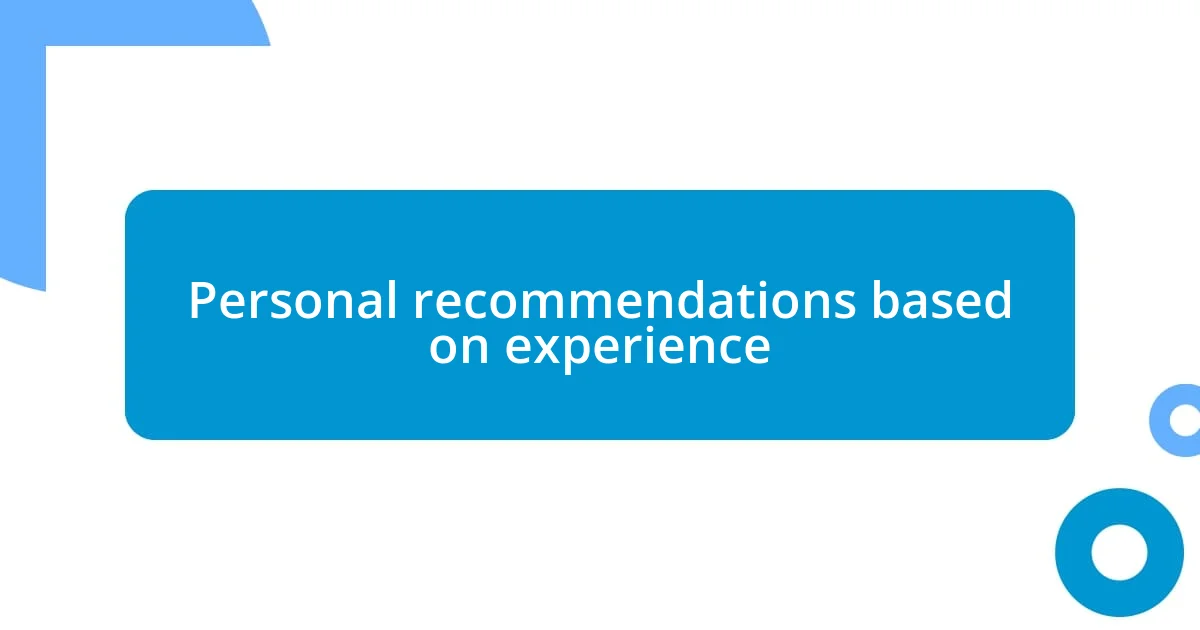
Personal recommendations based on experience
When I recommend a framework, one consideration that stands out is community support. During a particularly challenging project, I reached out to the Angular community for guidance on a complex routing issue. The prompt and valuable assistance I received not only salvaged my deadline but also reinforced my belief in choosing frameworks that have a vibrant support system. Isn’t it reassuring when you know help is just a forum post away?
Another factor I’ve learned to appreciate is the documentation quality. The first time I delved into Vue.js, I was pleasantly surprised by its clear and concise documentation. It felt like I had a mentor guiding me through each step. Have you ever encountered documentation that just clicks? It’s akin to having a roadmap when you’re lost, making the journey toward building a project far less daunting.
Lastly, I’ve found that the choice of a framework often hinges on personal preference and familiarity. Personally, jQuery is still close to my heart, even though it’s considered outdated by some. It was the first library I learned, and the thrill of manipulating the DOM with just a few lines of code made coding feel like magic. Isn’t it fascinating how certain tools embed themselves in our development identity? Choosing what resonates with you can truly enhance your coding experience.











